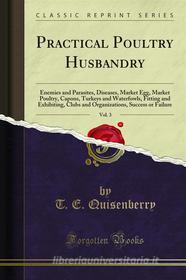
Ebook Practical Poultry Husbandry
- Editore:
Forgotten Books
- EAN:
9780259687122
- Formato:
- Protezione:
- Nessuna
- Dimensione:
- 81.83 Mb
Descrizione Ebook Practical Poultry Husbandry
There are about thirty-one known species of insects that infest poultry. You should learn about the habits of the most common in order to know how best to combat them. Here is one place where eternal vigilance is required. Many poultrymen wreck their business by not being eternally vigilant in the fight to keep the fowls free from these enemies. Some stay on the birds continually, others find their way to the cracks of the houses and filth and there multiply in great numbers. Some harass the fowls by their claw-like feet as they crawl over them. Others suck their blood and some live upon the feathers of the birds.
A thorough study of the habits and prevention of the insect enemies of poultry is essential and your poultry education would certainly be one-sided if you failed to master the art of ridding the houses and poultry of the various insect pests that harass the birds and cut the profits by lessened egg production, slower growth and death losses. It is not essential that you should know the scientific names of all the various kinds, but you should learn how to distinguish one from another in order that you may better know how to combat them. It is also well to know something of the many animals and birds of prey that destroy them. The hawk will sometimes swoop down on the flock and is away with the chicken without the knowledge of anyone, or the domestic cat will make constant inroads upon the flock and the causes of decrease will hardly be realized until the loss is very great.
The strict scientific definition of the term would not include all of the creatures that we here include under the term insects, but in this discussion we shall use the term as it is popularly known - parasites.
A parasite is an insect that gets its existence by preying upon fowl or animal life for its sustenance. Animals both wild and domestic sometimes prove destructive to the existence of fowls, and losses often occur without the knowledge of the owner of the flock but the greater losses occur from absolutely preventable causes. Some of these parasites live over the winter by hiding under rocks, old lumber or other rubbish near the poultry house. Even though your house is entirely clean in the winter a few will return at the first approach of warm weather and as they multiply so rapidly, it is only a short time until you have a real problem in their eradication. Prevention is worth much and an early start to keep the house entirely clean is the best policy. Even the third generation will bring forth a hundred thousand or more parasites.
Even the introduction of one infested chick into a brooder full will soon have the lot infested. It takes but a very short time for the sitting hen to become fairly alive with insects, so much so that she is unable to incubate eggs and they sometimes die on the nests. Their vitality is so lowered by continual preying of the insects on the hen's body for their life sustenance that she will die unless she abandons the nest. This is one of the disadvantages of late hatching in many sections, as parasites multiply so much more rapidly in warm weather.
Filth itself does not produce parasites, but is conducive to increased production. The very conditions that are injurious to the birds are conducive to more rapid growth in numbers of parasites. Poorly ventilated, damp houses full of filth, will help them to multiply by millions.
They are sometimes introduced into the flock by the purchase of new birds.


